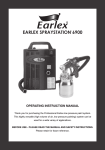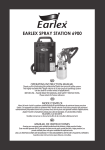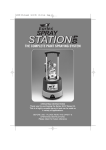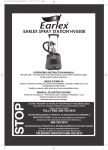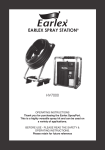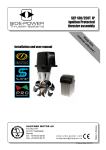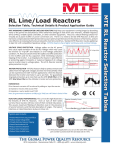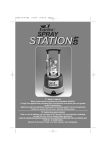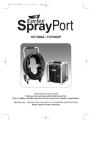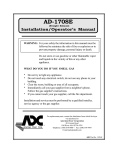Download Earlex 6900 Instruction manual
Transcript
HV6900 UK NO226 01-09 New-Style:Layout 2 15/1/09 10:15 Page 1 EARLEX SPRAY STATION 6900 OPERATING INSTRUCTION MANUAL Thank you for purchasing the Professional Earlex low pressure paint system. This highly versatile (high volume of air, low pressure painting) system can be used for a wide variey of applications. BEFORE USE - PLEASE READ THE MANUAL AND SAFETY INSTRUCTIONS. Please retain for future reference. Please read before use HV6900 UK NO226 01-09 New-Style:Layout 2 15/1/09 10:15 Page 2 SAFETY OPERATING INSTRUCTIONS • • • • • • PLEASE READ BEFORE USE Never under any circumstances aim the Spray Gun at another person or animal. In the event of injury occurring seek expert medical advice immediately. The Spray Gun must only be used with paints and solvents that have a flash point suitable for spraying. If in doubt, consult the paint or solvent manufacturer’s data. Always ensure there is adequate ventilation when spraying. NEVER spray near a naked flame, including appliance pilot light. NEVER smoke whilst spraying. NEVER allow children to operate or play with the Spray Gun. • Always read the solvent manufacturer’s instructions before use. • Always wear a suitable protective mask when spraying. We would also recommend the use of gloves, goggles and overalls. • • • • • • • • Always disconnect unit from mains supply when filling the paint container. After each use, thoroughly clean the Spray Gun and grease the Fluid Needle. This appliance is not intended for use by persons (including children) with reduced physical, sensory or mental capabilities, or lack of experience and knowledge, unless they have been given supervision or instruction concerning use of the appliance by a person responsible for their safety. Use only genuine manufacturer replacement parts. Always disconnect the Spray Station from the mains supply before cleaning the appliance. Warning. The use of any accessory or attachment, other than those recommended in this instruction manual, may present a risk of personal injury. Use the Spray Gun for the job it was designed for only. Mis-use of the Spray Gun will invalidate the guarantee. Wear ear protection. WARNING: The substances used with this Spray Gun (paints, solvents, etc.) may contain dangerous, harmful, explosive or corrosive materials. ALWAYS COMPLY WITH THE SAFETY INSTRUCTIONS ISSUED WITH THIS PRODUCT AND THE MATERIAL BEING USED. Only use the Spray Station as described in this manual. TECHNICAL SPECIFICATION: Wattage: 1100 Watts Container capacity: 1 litre Voltage: 230 V (50hz) Air hose length: 4.5 m Air output: 24L/sec Dynamic air pressure: 0.30 bar Sound pressure level: 96 dB (A) Maximum viscosity: 250DIN/sec 2 HV6900 UK NO226 01-09 New-Style:Layout 2 15/1/09 10:15 Page 3 EXPLODED PARTS VIEW 3 2 1 4 5 6 7 10 11 9 8 12 Power IN (IEC Connector) Circuit Breaker 7 13 17 14 18 15 16 19 20 26 (x2) 21 22 27 23 24 Mains Switch (230V) 25 PARTS LIST No. 1. 2. 3. 4. 5. 6. 7. 8. 9. 10. 11. 12. 13. 14. Description Air Cap Ring Air Cap Air Direction Plate 2.0mm Fluid Tip Fluid Tip Seal Pivot Screw Washer Main Body Assy 2.0mm Fluid Needle Adaptor Needle Spring Fluid Adjusting Screw Pivot Flexible Tube Air Feed Part No. L0151 L0517 L0162 L0157 L0159 L0179 L0195 L0180 L0166 L0174 L0175 L0176 L0178 L0182 No. 15. 16. 17. 18. 19. 20. 21. 22. 23. 24. 25. 26. 27. 3 Description Part No. Gland Nut L0173 Gland Seal (2 pcs) L0168 Trigger L0177 Centre Bolt & Pick Up Tube Assy L0183 Yoke L0184 Clamp Lever L0185 Shim L0186 Lid Assy L0187 Gasket L0188 Centre Bolt Nut L0189 Paint Container L0190 Filter (x2) N0087 Air Hose SG243 HV6900 UK NO226 01-09 New-Style:Layout 2 15/1/09 10:15 Page 4 INTRODUCTION The concept A motor feeds out a high volume of air (HV) and enables products to be sprayed at a low pressure (LP). The product is released from the Fluid Tip of the Spray Gun at a very low pressure (0.18 bar) and is enclosed in a high volume of air. The Hose feeds the air produced by the motor to the Spray Gun. The powerful motor can spray a width range of paint with or without dilution. However, there will always be some paint which will not be suitable for the Spray Gun. The good quality paint contains a high percentage of dry particles which make the dilution easier. The users must keep in mind that low temperatures make the paint thicker, that’s why we recommend spraying with the Spray Gun with a 15 degrees minimum temperature. PREPARATION • Carefully cover areas which are not to be painted with a plastic cover and protective tape. • Wear a suitable mask when spraying products (and make sure there is adequate ventilation in the room when working indoors). • Clean the surface you are going to paint. As well as being clean, it must also be dry and smooth. • Practice first on some old wooden planks to make sure you are holding the Spray Gun correctly. • We recommend you wear protective clothing • Stir the paint well using a mixer where possible. • Make sure there are no solid particles in the paint. • Many products can be sprayed without being thinned. However, if the application is not good, thin the product progressively in stages of 5%. • Most paints can be sprayed by being thinned just a little, e.g. by 5% or 10%. • Some thick paints such as outer wall paints and certain undercoats will need to be thinned by 20% or 25%. • Use water to thin a water-based product. • Use white spirit to thin a solvent-based product. • Certain manufacturers will indicate on the can whether a specific thinner is to be used. The viscosity, which is expressed in DIN/sec, is the time it takes for the paint Fig. 1 to stop running as a continuous flow through the viscosity cup (Fig 1). Your Spray Station 6900 comes with a 2.0mm Fluid Tip and a 2.0 mm Fluid Needle fitted. For the best results with products which are more runny (liquid dyes, varnishes, runny paints, wood dyes), we recommend that you purchase the 1.5 mm Fluid Tip and Fluid Needle. This applies for products which have a viscosity between 25 and 50 DIN/sec, i.e., which will take between 25 and 50 seconds to run through the viscosity cup. Refer to the chapter on cleaning to see how the Fluid Tip and Fluid Needle can be removed and switched for a smaller/larger Fluid Tip and Fluid Needle assembly. • Fill the Paint Container with the product to be sprayed. Stir well (as mentioned above). • Screw the Paint Container to the base of the Spray Gun and tighten accordingly. • Unroll the motor unit air hose and attach it to the back of the Spray Gun. • Unroll the power cable and attach the plug to the mains supply. • Switch the Spray Station on. This will immediately cause some air to be produced, which is quite NORMAL. However, none of the product will be sprayed until the Spray Gun trigger is pulled. Very important: when spraying for the first time, we recommend that you always leave the motor to run for 1 to 2 minutes before applying the product. Do not forget that the Fluid Adjusting Screw controls the quantity of paint sprayed, for instance the more the Paint Adjusting Screw is tightened the less paint is sprayed. 4 Spraying Technique HV6900 UK NO226 01-09 New-Style:Layout 2 15/1/09 SPRAYING TECHNIQUE Horizontal and Vertical Spray Vertical and Horizontal for normal sized jobs (Fig.2) 10:15 Page 5 Fig. 2 Round Spray Round for small and precise jobs The most commonly used technique for painting a wall is the ‘crisscross’ technique, i.e. you apply the Vertical Spray Horizontal Spray product in horizontal lines and then cross over these lines by applying the product in vertical lines; (Fig. 3) 1) Adjust the Air Cap to obtain a Vertical spray, then pull the Trigger and move your arm across to the right. 2) When you get to the end of the line, release the Trigger for a moment and then apply the product in the opposite direction just beneath the line you have sprayed. 3) Proceed in this manner applying the product in Horizontal lines one underneath the other. 4) Next, adjust the Air Cap to obtain a Horizontal spray and apply the product in horizontal lines over the lines you have just sprayed. Release the trigger to avoid overspraying which will cause the product to run. Round Spray Fig. 3 Let go of the trigger at the end of each spray movement to avoid excessive paint and drips Cross over the horizontal lines (spayed with a Vertical pattern) with vertical lines (sprayed with a Horizontal pattern). Only the fore arm must move not the wrist. 5 HV6900 UK NO226 01-09 New-Style:Layout 2 15/1/09 10:15 Page 6 CLEANING SPRAY GUN Type of paint Water based paint Oiled based paint Cleaning Clean with water Clean with white spirit Removing the Fluid Tip and Fluid Needle assembly (for cleaning or switching to a smaller/larger diameter). Flush out the residue paint from the spray gun, as follows: Remove the paint container (25) from the spray gun. Pour any residual paint into its original container for future use. Use a cloth soaked in thinners to wipe out excess paint from the container, the underside of the lid (22) & the gasket (23). Pour a small quantity of clean thinners into the container, re-fit the container to the spray gun and shake the gun lightly. Now spray all of the thinners through the gun. Repeat this, each time using clean thinners, until there is no trace of paint in the thinners being sprayed. G G G G G G To thoroughly clean the remainder of the spray gun, remove all working parts as per the exploded spare parts drawing on p.3 as follows. Loosen and remove Air Cap Ring (1), Air Cap (2) and Air Distributor Plate & Spring (3). Now unscrew the Adjusting Screw (12) and pull out the Needle (9) and Needle Spring (11). Use the supplied spanner, to remove the Fluid Tip (4) and Fluid Tip Seal (5). G G G All of the components above can be immersed in thinners and cleaned using the cleaning kit supplied with this product. After cleaning your spray gun and before fitting the needle, dip the tip into some vaseline which will lubricate the gland washers as the needle is inserted. • NEVER DISPOSE OF PAINTS OR SOLVENTS DOWN THE DRAIN. ALWAYS USE YOUR LOCAL WASTE COLLECTION SITE. 6 HV6900 UK NO226 01-09 New-Style:Layout 2 15/1/09 TROUBLESHOOTING PROBLEM CAUSE Add undiluted paint Reduce the paint output by adjusting the Fluid Adjusting Screw (12) Moving too slowly Spray Trigger held for too long Spray Gun too close Release Trigger sooner Increase the distance between the Spray Gun and the work surface Add undiluted paint Moving too fast Reduce speed of application Paint output too low Increase the paint output by adjusting the Fluid Adjusting Screw (12) Clean the Spray Gun Gun too far away Move the Spray Gun closer to the work surface Paint too thick Add thinner Pick-up Tube clogged Clean Pick-up Tube (18) Fluid Tip clogged Clean the Fluid tip Air Hose split Grainy paint Replace air Hose (14) Filter the paint Container almost empty Refil Paint Container Spray Gun at an angle Check that the Pick-up Tube is pointing towards the paint (18) Air inlet blocked Gland Seal (16) not attached or Paint leaking from the Gland Nut (15) in the wrong way round or not tight enough. front of the Trigger Over time the Gland Seal (16) will wear and need adjusting Too much paint in an You move you wrist area Pulverisation Increase speed of application Paint too diluted Gun clooged No paint being released Page 7 ACTION REQUIRED The paint drips onto Paint too diluted item being painted Paint output too high Paint is too thin or irregular 10:15 Either too much or not enough paint 7 Check the condition of the Filter and clean if necessary (26 x2) Reattach the Gland Seal (16)and retighten Gland Nut. (15) To check the Gland Nut is correctly fitted you will need a small ad justable spanner. Pull the Trigger back and gradually tighten the gland but by turning it in a clockwise direction until the needle is not free to move when the trigger is released Move your fore arm instead Use the Fluid Adjusting Screw to control the flow HV6900 UK NO226 01-09 New-Style:Layout 2 15/1/09 10:15 Page 8 PLEASE NOTE: We have done all we can to ensure that when used correctly and in accordance with these instructions the spray gun has a long and fault-free life. We accept no responsibility for damage caused by the use of incorrect or unsuitable substances, paints or liquids which have not been thinned correctly or which are not suitable for the surfaces to which they are applied, health hazards arising from a lack of ventilation when working in confined spaces or equipment which is faulty due to inadequate cleaning of the components after use. If in doubt, test a small inconspicuous area first. Always read the manufacturer’s instructions before use. Neither our guarantee nor the above statement affects your statutory rights. MAINS CONNECTION Your Spray Station has been supplied with a mains lead which is fitted with a plug. • If the plug is cut off from the mains lead, it must be disposed of safely. NEVER under any circumstances insert a plug which is cut off from the mains lead into socket. ENVIRONMENTAL INFORMATION Please do not dispose of tools with your household waste collected by the council. Design Registrations: GB 3022947, GB 3022948, FR 06/5463, FR 06/5462, EU 000608858, US D562,544, US D563,503 All rights reserved © 2009 EARLEX LTD. WILL ACCEPT NO RESPONSIBILITY FOR THE USE OF THIS PRODUCT IF USED FOR ANY OTHER PURPOSES THAN THOSE DETAILED HEREIN. GUARANTEE and HELPLINE This product is guaranteed for a period of 24 months against faulty manufacture or materials. It is not guaranteed for industrial or hire purposes. This guarantee does not affect your statutory rights. For further information or any user advice, please phone our helpline between 9 am and 5 pm Mondays to Fridays (excluding Bank Holidays), or visit our website www.earlex.fr Earlex Limited, Opus Park, Moorfield Road, Guildford, Surrey, GU1 1SZ, UK Tel: +44 (0) 1483 454666. Fax: +44 (0) 1483 454548 Web: www.earlex.co.uk Email: [email protected] © 2009 Earlex Ltd. 8 N0226 01/09








